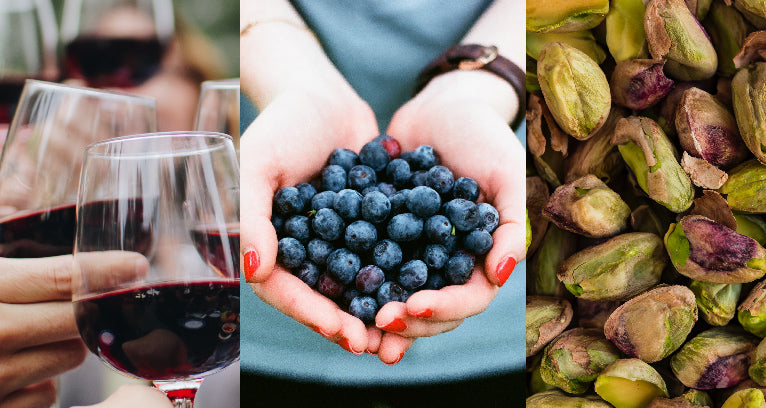
Excerpts from “Resveratrol: Live Long, Live Well,” by Matidle Parente, MD
What even is Resveratrol?
Resveratrol is a phytochemical, a substance that occurs naturally in plants. Resveratrol belongs to a class of compounds called polyphenols, which protect plants against invaders such as fungi and bacteria. Recently, polyphenols have garnered attention for their potential to benefit human health.
Natural Sources
There are a large variety of natural sources that are rich in resveratrol. By incorporating or increasing the intake of such sources in your diet, you can reap the wonderful benefits of resveratrol. Some natural sources include:
- Grapes and grape products (found mostly in the skin, not the interior)
- Wine (the crushed pulp and juices extracted from red wine grapes are left in contact with their skins, while crushed white wine grapes are not, thus red wine is higher in resveratrol).
- Berries, including: blueberries, cranberries, bilberries or huckleberries, raspberries, lingonberries and mulberries
- Nuts, including: peanuts, pistachios and some species of pine nuts
- Chocolate and other cocoa products
People who do not regularly consume foods with resveratrol may consider supplementing their diet with resveratrol. Most resveratrol supplements feature Japanese knot-weed extract, but some tap other sources such as red wine extract and grapeseed extract. Although researchers have not yet determined the optimal dose of resveratrol, most supplements contain 10 to 50 milligrams of the phytonutrient.
Resveratrol in Action
Resveratrol is no one-trick pony. Resveratrol is well known as an antioxidant and anti-inflammatory, and animal studies suggest resveratrol may also have antiviral and antibacterial activities.
Perhaps most intriguing is resveratrol’s ability to affect or modulate certain genes related to longevity. Resveratrol may help to slow the aging process by mimicking the effects of caloric restriction. Researchers are also investigating resveratrol’s potential ability to help the body fight aging by priming or preconditioning vital structures such as the heart and brain.
Resveratrol as an Antioxidant
As an antioxidant, resveratrol helps protect the body from the negative impact of free radicals. Free radicals contain an unpaired electron and are therefore highly unstable. Cigarette smoke, pollutants, toxic substances and ultraviolet radiation can all create free radicals. Free radicals also occur naturally inside the body as by-products of metabolic processes.
To gain stability, free radicals steal electrons from other molecules, damaging the other molecules in the process. Free radicals can damage cellular membranes, mitochondria, proteins and even DNA. This damage, is the cellular equivalent of rust. Oxidative damage is associated with aging, illness and even cancer. Antioxidants—such as resveratrol—help neutralize free radicals.
In 2006, researchers compared resveratrol to other phytonutrients and plant extracts, including grapeseed extract and olive leaf extract. According to the results of the study, published in the Journal of Medicinal Food, resveratrol had powerful protective properties against free radicals.
In addition to neutralizing free radicals, resveratrol may help the body maintain healthy levels of glutathione reductase and superoxide dismutase (SOD), two antioxidant enzymes critical to the body’s defense mechanisms. Furthermore, resveratrol increases production of nitric oxide (NO), a messenger molecule that helps blood vessels relax and maintain their integrity.
Resveratrol as an Anti-Inflammatory
In addition to fighting free radicals, resveratrol may ease temporary inflammation. Resveratrol won’t cure an aching knee or subdue a raging headache, but it may have far more important anti-inflammatory effects.
Injury from a variety of causes incites temporary inflammation. When injury occurs, white blood cells and other inflammatory molecules flock to the damaged site. As these molecules flood the inflammatory center, inflammation leads to more inflammation, firing up a raging reaction that often proves difficult to extinguish.
Resveratrol is an anti-inflammatory molecule. Resveratrol appears to naturally inhibit inflammatory molecules, including enzymes linked to pain and inflammation that is the target of anti-inflammatory drugs.
What Else Can Resveratrol Help With?
Beyond acting as an antioxidant and an anti-inflammatory, resveratrol has other properties that can help with or support a variety of health-related things. Resveratrol can help to:
- Support the body when faced with blood clots in humans
- Calm and nourish the endothelial (lining of blood vessel walls) to support function
- Support healthy coronary blood flow and recovery of heart function following ischemic injury
- Boost heme-oxygenase (HO) levels, an antioxidant enzyme that protects sensitive brain cells
- May help to improve lung function
- Support the body when faced with fatty liver disease
- Promote stomach lining health and reduce temporary stomach inflammation
Ultimately, if you’re looking to round-out your health and wellness routine, resveratrol could be the key. With the plethora of health benefits associated with resveratrol, you’re sure to find something about it that can help to benefit you.



